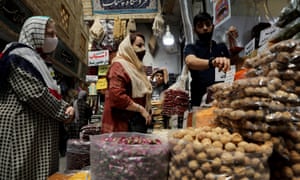
Iran’s government has ignored repeated requests from senior prison officials for help in containing coronavirus in the country’s overcrowded jails, according to Amnesty International.
The rights group said it reviewed copies of four letters to the health ministry signed by officials at Iran’s Prisons Organisation, “raising the alarm over serious shortages of protective equipment, disinfectant products, and essential medical devices”.
The ministry “failed to respond, and Iran’s prisons remain catastrophically unequipped for outbreaks,” Amnesty said in a statement.
Iran has been battling to contain the Middle East’s deadliest novel coronavirus outbreak since announcing its first cases on 19 February . Authorities have confirmed over 16,000 deaths from coronavirus.
Amnesty said the head of the health care office at the Prisons Organisation had first submitted a letter to the health ministry requesting help on 29 February, before follow-up letters were sent in March, May, June and July.
The March letter had requested disinfectant products and protective equipment to last three months, including 1m litres of surface disinfectant and 5.4m Amnesty said.
“These official letters provide damning evidence of the government’s appalling failure to protect prisoners,” said Diana Eltahawy, Amnesty International’s deputy regional director for the Middle East and North Africa.

Amnesty said the letters “stand in stark contrast” to public statements by the advisor to the head of the judiciary, Asghar Jahangir, who has lauded Iran’s “exemplary” initiatives to protect prisoners from the pandemic.
The rights group said it had “received distressing reports of prisoners displaying COVID-19 symptoms being neglected for days, even when they have pre-existing heart and lung problems, diabetes or asthma.”
“When their conditions worsen, many are merely quarantined in a separate section in the prison or placed in solitary confinement, without access to adequate health care,” the rights group alleged.
Since March, more than 100,000 detainees in Iran have been granted temporary release or sentence remissions to help limit infections in prisons.
But a UN group of experts said this month that released inmates were now being returned to prison, despite a second wave of the virus in the country.


